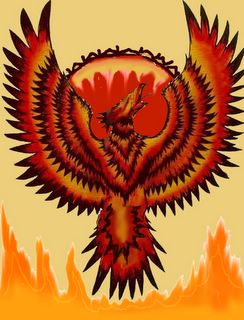Wednesday, May 11, 2005

Did this in 2004, and at the time it did mean a lot to me. Tweaked an original work, the bird aint mine, but the colour enhancing and the flames and sun and such are. Baby work, and yet...A phoenix was and sometimes still is, everything good- its not death, really. Nothing ever ends. And I like the way there's only one of 'em.

Tuesday, May 10, 2005
Feather and Leaf, June 2003
Entered this story for the royal commonwealth essay writing competition, 2003. Its a competition to all the countries that belong to the commonwealth, so Im told it was quite a big thing. The story wrote itself in one night. I sent in the first draft. I was declared joint 3rd with a student from Namibia, here at their website:
http://www.rcsint.org/essay/winners/?os=103&os=101&subSection=winners2003&os=105#105
The story could do with some work. But Im still pretty happy with it.
_________________________________________________________________
Feather and leaf
The smell is what you will always remember. The heavy-scented incense sticks, the agarbati, which always burnt at times of death. I can almost see those grey soldiers from the wars this country always had (will always have, forever, amen? One despairing, begs to differ) leaving their mud selves, the funeral smoke their last memory.... yes, always the incense. I’m trying to not breathe in the fumes; you learn to hate it, because you only see those slow curling black sticks when there is wailing, and crying, and terrible hard, harsh music: music to keep the unrelenting evil spirits away- (how do we know they're evil? Floating, flying, inquisitive...not evil, surely)- and death. Always death.
I walked out quickly, the soles of my feet being brushed by the light, silken folds of my sari (used to like that feeling). The same shame-faced, unnatural smile on all the faces I pass, all saying the same thing. It’s supposed to be one of sympathy, accompanied by polite noises and (that smell. Always that smell. Why?) "Your mother was a beautiful person, so cheerful, so patient with the pain, right till the end." (Mother. Don’t you dare talk about her. You weren't her daughter). I smile, painfully: it’s not that difficult to do now. I got out finally though, and stood on the cold stone porch, staring into the neem tree in front of me, letting the tiny puffs of wind blow strands of my hair across my face- (so, green is a calming colour...hmm) Why do they have to say anything? Funerals should be made of silence. In this, my land, my country (my home? No.) funerals are about noise and smell: agarbati and jasmine, and then the pipes and drums. But how can they be so sure the noise keeps the spirits away? Maybe the spirits like the noise. At least, that would explain why my old grandaunt keeps shuffling around the house muttering something about seven years of bad luck. I smiled at that, feeling my eyebrows ease out of a tight frown. Others would die. My grandaunt was immortal. At the end of days, when people of all religions would be praying or cursing, with fire and earthquakes everywhere, she would be standing over a pot of her simmering rasam, stirring and yelling at everyone around, just the way she yelled at all her children and their children's children, to keep away, at least till lunch was done. They live forever, old Indian women. They're stronger than rock...in fact, they are rock. (I’ve been broken too many times. Hardness must break sometime, and then what? pick up the pieces, or try living with the confused, doubting human softness underneath?)- But sometimes they die. My mother is dead.
Her last memory, of fire and agarbati. I looked up, squinting in the sunlight. Something had fluttered in the tree in front of me. A crow...no. It was a raven. My sarees' folds got caught in the rough coir mat on the floor. I stooped to untangle it. (Deja vu. Grandfather. Ravens flying, circling, cawing.... the old man is dead).
(15 years ago, when I was a girl in my father's house. My silken skirt, my pavadai, had got stuck in the door. As I had tugged to loosen it, the cawing had started. Shrieking, talking, laughing, crying in hoarse, hard voices. I had been scared. But our old man servant had told me it was just my ancestors come back as ravens to take my grandfather's spirit with them to the spirit world. "Is appupa with them?". "Yes, now he is". I had run out under that black circling cloud, calling out,” come back, come back appupa.... come back". The old man carried me back into the house, while I struggled to get free. I had heard appupa call back to me. My cries faded into the house, faded into the smell of incense, while the ravens outside shrieked and laughed and cried...maybe the old man said goodbye then. But I couldn’t hear him).
A Raven. The natives of this place (why can't I say my people?) fear them, and keep away from the black birds. Anything black in this country is associated with death. But those glossy, charcoal black feathers, and shining eyes. Cruel maybe, but evil? I never thought so anyway. (Thought. Hugin, Odin's raven...Hugin, who brought thought, ideas to men whom Odin blessed). Mythology was all people had these days to remind them of who they were: people with a past, people of an ancient land. Mythology and traditions. The black smoke, the noise, the rituals of ghee and flowers. It gave them an identity. I collected ideas, and stories of the places I travelled, things I saw (mother used to collect shells whenever the family visited the beach). And I wrote the things I heard and saw. Maybe, somewhere in all of this writing, I can find that one thought- a singularity- that I'm looking for, which will finally get rid of that pain I feel at night, when I lie awake. People call it fear or stress. (Maybe it’s an evil spirit. Maybe it's grandfather. That bird is looking at me, I can feel it).
The woman sat down suddenly on the stone, cooled now by the monsoon wind now rushing by in cold streams of wet air. Voices from inside shouted, laughed and chatted, while the odour of just-steamed white rice and fried mango cooked in a tantalizing curry of coconut, chilli and tamarind wafted out to the courtyard outside. Funerals, like weddings are social events: after the dead are sent on their way, the living have to be fed. People do get hungry, and grief cannot stop life, however heavy its hold. The girl still sat there, even as the clouds cast heavy shadows over the waiting, heated earth, staring at the raven in the neem tree.
(Hmmm... maang kutan. Smells just like mum's. She never forgot her recipes, and they always came out perfect. I could never remember them. Bad memory, she always said with a smile. Who needs memories to think about, when you can have ideas and words and music and thought....Munin, Odin's raven for memory. Interesting people, the Vikings. Warriors. They would die rather than show pain)
It’s always interesting to note how people all over the world differ in the tiniest of ideas and beliefs. Natives of India fear the big black birds, but the Vikings respected and honoured them. The birds stood for victory and inspiration. In India? Souls of the dead....spectators, sometimes messengers. (So maybe this is mother come to tell me something. Maybe goodbye. Will she stay?) When we had done the ceremonious feeding of the crows in my father's house to satisfy the spirits of our ancestors, everyone had noticed the one raven that had just sat and watched the others finish the boiled rice, and had muttered secret prayers. Quirky superstition. I had known it was appupa and of course he wouldn't eat. When did my grandfather ever eat a meal without a generous sprinkling of salt on his rice? But nobody listened.
My memory is quite bad, you know. People I met at weddings, and cousins I am supposed to have, have faces that I can never recall, and their relationships to me are even more blurred in my head. Even at Grandfather's funeral, when my mother had tried introducing me to out-of-town relatives, I remember -wonder of wonders- that all I kept asking her constantly was, "but where did appupa go?" I got an angry answer. (And then my mother's racking sobs, me tasting her salty tears on my face as she had held me close. Maybe she had never wanted to let go. Well, I can. Grieving is such a waste of strength. Mum's gone, but everybody goes someday. I’m not showing any pain. I have no tears. I can be rational about this)
But I do remember certain things. The way my grandfather would fall asleep, the sound of his snores gently crashing through the stillness of his room. The way my mother would stand damp and dishevelled, concentrating while stirring a curry or two... Concentrating while reading my first attempts at poetry. You see, there was a Dylan Thomas phase, and that coupled with my love for Khalil Gibran-one only loves life, and colour and beauty that much when one is fourteen- set me off on some rather startling imagery. But mother was always patient- Always a good cook. And a good mother. What was I then? Mum always called me her "kuruvi" or sparrow. But I never could agree. What sparrow could sit awake through midnight and till dawn on the lonely terrace of our house, wondering at the stars and the pyramids (and the Vikings. Warriors, forever fighting, sailing, dying). I love the night. It's quiet and there's a warm darkness, like the many evenings we spent in silence- the family and me watching the candles burn lower whenever the electricity failed. Silent living, appupa called it. You don’t get that much these days, simply because the electricity fails rarely now (GE, we bring good things to life?). Yes, I loved the darkness. I could be a night bird then, smoothly winging across a purple night sky, a shadow against the stars. Maybe a raven...
Mother always loved the stories I told her about my travels. She listened to them with as much quiet attention as she gave the twenty-three minute conversation I had with her long distance, three years ago when I told her that my husband and I were going to be divorced. I had not cried then, but later...it wasn’t her sympathy but her strength, which had unmanned me (perhaps unwomanned? connotations in the English language need work) . She had told me to never forget that the neem tree stands, whether scorched by lightening or aged by time. Even after its time of waking life, till its whole existence is nothing more than a memory of sunrises, sunsets and people who have come, been refreshed by its shade, and left, never to be seen again. Everything comes and goes, but the tree stands. Till God wills it to fall. But she was now gone.
The old watchman swivelled towards the sound of the sob he heard issuing from the woman. So she was finally crying. But he looked up immediately, as a drop fell on his head, then another and another. The monsoon had begun. He sighed happily, knowing he would get his hot meal now, and turned to look at the woman. His eyes slowly widened as he looked hurriedly towards the door. For there she stood, laughing at a big black wet crow in the neem tree, as the rain fell around her, merging with the salt tears running off her nose and chin.
I couldn’t help myself. I realise now, it could only happen this way. Mum always had a sense of humour. The raven was still there. It hadn’t flown away. And you couldn’t smell the incense anymore, in all this glorious wet. (I cannot reflect the Icelandic frozen whiteness some Olaf or Ragnarsson could. I am a leaf of a tree that has stood long ages, a leaf that dances in the wind, that burns in the sun then falls to earth dry, to break and die. Then to be reborn, and fly in the watches of the night into a final unending light, where dark wings are not feared, but all fly). The rain drenched me, and the street was empty, but the raven was still there.
http://www.rcsint.org/essay/winners/?os=103&os=101&subSection=winners2003&os=105#105
The story could do with some work. But Im still pretty happy with it.
_________________________________________________________________
Feather and leaf
The smell is what you will always remember. The heavy-scented incense sticks, the agarbati, which always burnt at times of death. I can almost see those grey soldiers from the wars this country always had (will always have, forever, amen? One despairing, begs to differ) leaving their mud selves, the funeral smoke their last memory.... yes, always the incense. I’m trying to not breathe in the fumes; you learn to hate it, because you only see those slow curling black sticks when there is wailing, and crying, and terrible hard, harsh music: music to keep the unrelenting evil spirits away- (how do we know they're evil? Floating, flying, inquisitive...not evil, surely)- and death. Always death.
I walked out quickly, the soles of my feet being brushed by the light, silken folds of my sari (used to like that feeling). The same shame-faced, unnatural smile on all the faces I pass, all saying the same thing. It’s supposed to be one of sympathy, accompanied by polite noises and (that smell. Always that smell. Why?) "Your mother was a beautiful person, so cheerful, so patient with the pain, right till the end." (Mother. Don’t you dare talk about her. You weren't her daughter). I smile, painfully: it’s not that difficult to do now. I got out finally though, and stood on the cold stone porch, staring into the neem tree in front of me, letting the tiny puffs of wind blow strands of my hair across my face- (so, green is a calming colour...hmm) Why do they have to say anything? Funerals should be made of silence. In this, my land, my country (my home? No.) funerals are about noise and smell: agarbati and jasmine, and then the pipes and drums. But how can they be so sure the noise keeps the spirits away? Maybe the spirits like the noise. At least, that would explain why my old grandaunt keeps shuffling around the house muttering something about seven years of bad luck. I smiled at that, feeling my eyebrows ease out of a tight frown. Others would die. My grandaunt was immortal. At the end of days, when people of all religions would be praying or cursing, with fire and earthquakes everywhere, she would be standing over a pot of her simmering rasam, stirring and yelling at everyone around, just the way she yelled at all her children and their children's children, to keep away, at least till lunch was done. They live forever, old Indian women. They're stronger than rock...in fact, they are rock. (I’ve been broken too many times. Hardness must break sometime, and then what? pick up the pieces, or try living with the confused, doubting human softness underneath?)- But sometimes they die. My mother is dead.
Her last memory, of fire and agarbati. I looked up, squinting in the sunlight. Something had fluttered in the tree in front of me. A crow...no. It was a raven. My sarees' folds got caught in the rough coir mat on the floor. I stooped to untangle it. (Deja vu. Grandfather. Ravens flying, circling, cawing.... the old man is dead).
(15 years ago, when I was a girl in my father's house. My silken skirt, my pavadai, had got stuck in the door. As I had tugged to loosen it, the cawing had started. Shrieking, talking, laughing, crying in hoarse, hard voices. I had been scared. But our old man servant had told me it was just my ancestors come back as ravens to take my grandfather's spirit with them to the spirit world. "Is appupa with them?". "Yes, now he is". I had run out under that black circling cloud, calling out,” come back, come back appupa.... come back". The old man carried me back into the house, while I struggled to get free. I had heard appupa call back to me. My cries faded into the house, faded into the smell of incense, while the ravens outside shrieked and laughed and cried...maybe the old man said goodbye then. But I couldn’t hear him).
A Raven. The natives of this place (why can't I say my people?) fear them, and keep away from the black birds. Anything black in this country is associated with death. But those glossy, charcoal black feathers, and shining eyes. Cruel maybe, but evil? I never thought so anyway. (Thought. Hugin, Odin's raven...Hugin, who brought thought, ideas to men whom Odin blessed). Mythology was all people had these days to remind them of who they were: people with a past, people of an ancient land. Mythology and traditions. The black smoke, the noise, the rituals of ghee and flowers. It gave them an identity. I collected ideas, and stories of the places I travelled, things I saw (mother used to collect shells whenever the family visited the beach). And I wrote the things I heard and saw. Maybe, somewhere in all of this writing, I can find that one thought- a singularity- that I'm looking for, which will finally get rid of that pain I feel at night, when I lie awake. People call it fear or stress. (Maybe it’s an evil spirit. Maybe it's grandfather. That bird is looking at me, I can feel it).
The woman sat down suddenly on the stone, cooled now by the monsoon wind now rushing by in cold streams of wet air. Voices from inside shouted, laughed and chatted, while the odour of just-steamed white rice and fried mango cooked in a tantalizing curry of coconut, chilli and tamarind wafted out to the courtyard outside. Funerals, like weddings are social events: after the dead are sent on their way, the living have to be fed. People do get hungry, and grief cannot stop life, however heavy its hold. The girl still sat there, even as the clouds cast heavy shadows over the waiting, heated earth, staring at the raven in the neem tree.
(Hmmm... maang kutan. Smells just like mum's. She never forgot her recipes, and they always came out perfect. I could never remember them. Bad memory, she always said with a smile. Who needs memories to think about, when you can have ideas and words and music and thought....Munin, Odin's raven for memory. Interesting people, the Vikings. Warriors. They would die rather than show pain)
It’s always interesting to note how people all over the world differ in the tiniest of ideas and beliefs. Natives of India fear the big black birds, but the Vikings respected and honoured them. The birds stood for victory and inspiration. In India? Souls of the dead....spectators, sometimes messengers. (So maybe this is mother come to tell me something. Maybe goodbye. Will she stay?) When we had done the ceremonious feeding of the crows in my father's house to satisfy the spirits of our ancestors, everyone had noticed the one raven that had just sat and watched the others finish the boiled rice, and had muttered secret prayers. Quirky superstition. I had known it was appupa and of course he wouldn't eat. When did my grandfather ever eat a meal without a generous sprinkling of salt on his rice? But nobody listened.
My memory is quite bad, you know. People I met at weddings, and cousins I am supposed to have, have faces that I can never recall, and their relationships to me are even more blurred in my head. Even at Grandfather's funeral, when my mother had tried introducing me to out-of-town relatives, I remember -wonder of wonders- that all I kept asking her constantly was, "but where did appupa go?" I got an angry answer. (And then my mother's racking sobs, me tasting her salty tears on my face as she had held me close. Maybe she had never wanted to let go. Well, I can. Grieving is such a waste of strength. Mum's gone, but everybody goes someday. I’m not showing any pain. I have no tears. I can be rational about this)
But I do remember certain things. The way my grandfather would fall asleep, the sound of his snores gently crashing through the stillness of his room. The way my mother would stand damp and dishevelled, concentrating while stirring a curry or two... Concentrating while reading my first attempts at poetry. You see, there was a Dylan Thomas phase, and that coupled with my love for Khalil Gibran-one only loves life, and colour and beauty that much when one is fourteen- set me off on some rather startling imagery. But mother was always patient- Always a good cook. And a good mother. What was I then? Mum always called me her "kuruvi" or sparrow. But I never could agree. What sparrow could sit awake through midnight and till dawn on the lonely terrace of our house, wondering at the stars and the pyramids (and the Vikings. Warriors, forever fighting, sailing, dying). I love the night. It's quiet and there's a warm darkness, like the many evenings we spent in silence- the family and me watching the candles burn lower whenever the electricity failed. Silent living, appupa called it. You don’t get that much these days, simply because the electricity fails rarely now (GE, we bring good things to life?). Yes, I loved the darkness. I could be a night bird then, smoothly winging across a purple night sky, a shadow against the stars. Maybe a raven...
Mother always loved the stories I told her about my travels. She listened to them with as much quiet attention as she gave the twenty-three minute conversation I had with her long distance, three years ago when I told her that my husband and I were going to be divorced. I had not cried then, but later...it wasn’t her sympathy but her strength, which had unmanned me (perhaps unwomanned? connotations in the English language need work) . She had told me to never forget that the neem tree stands, whether scorched by lightening or aged by time. Even after its time of waking life, till its whole existence is nothing more than a memory of sunrises, sunsets and people who have come, been refreshed by its shade, and left, never to be seen again. Everything comes and goes, but the tree stands. Till God wills it to fall. But she was now gone.
The old watchman swivelled towards the sound of the sob he heard issuing from the woman. So she was finally crying. But he looked up immediately, as a drop fell on his head, then another and another. The monsoon had begun. He sighed happily, knowing he would get his hot meal now, and turned to look at the woman. His eyes slowly widened as he looked hurriedly towards the door. For there she stood, laughing at a big black wet crow in the neem tree, as the rain fell around her, merging with the salt tears running off her nose and chin.
I couldn’t help myself. I realise now, it could only happen this way. Mum always had a sense of humour. The raven was still there. It hadn’t flown away. And you couldn’t smell the incense anymore, in all this glorious wet. (I cannot reflect the Icelandic frozen whiteness some Olaf or Ragnarsson could. I am a leaf of a tree that has stood long ages, a leaf that dances in the wind, that burns in the sun then falls to earth dry, to break and die. Then to be reborn, and fly in the watches of the night into a final unending light, where dark wings are not feared, but all fly). The rain drenched me, and the street was empty, but the raven was still there.














